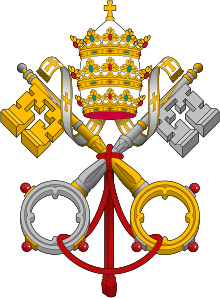Portal:Catholic Church
Introduction The Catholic Church, also known as the Roman Catholic Church, is the largest Christian church, with 1.28 to 1.39 billion baptized Catholics worldwide as of 2024. It is among the world's oldest and largest international institutions and has played a prominent role in the history and development of Western civilization. The church consists of 24 sui iuris churches, including the Latin Church and 23 Eastern Catholic Churches, which comprise almost 3,500 dioceses and eparchies around the world. The pope, who is the bishop of Rome, is the chief pastor of the church. The Diocese of Rome, known as the Holy See, is the central governing authority of the church. The administrative body of the Holy See, the Roman Curia, has its principal offices in Vatican City, which is a small, independent city-state and enclave within the city of Rome, of which the pope is head of state and absolute elective monarch. The core beliefs of Catholicism are found in the Nicene Creed. The Catholic Church teaches that it is the one, holy, catholic and apostolic church founded by Jesus Christ in his Great Commission, that its bishops are the successors of Christ's apostles, and that the pope is the successor to Saint Peter, upon whom primacy was conferred by Jesus Christ. It maintains that it practises the original Christian faith taught by the apostles, preserving the faith infallibly through scripture and sacred tradition as authentically interpreted through the magisterium of the church. The Roman Rite and others of the Latin Church, the Eastern Catholic liturgies, and institutes such as mendicant orders, enclosed monastic orders and third orders reflect a variety of theological and spiritual emphases in the church. Of its seven sacraments, the Eucharist is the principal one, celebrated liturgically in the Mass. The church teaches that through consecration by a priest, the sacrificial bread and wine become the body and blood of Christ. The Virgin Mary is venerated as the Perpetual Virgin, Mother of God, and Queen of Heaven; she is honoured in dogmas and devotions. Catholic social teaching emphasizes voluntary support for the sick, the poor, and the afflicted through the corporal and spiritual works of mercy. The Catholic Church operates tens of thousands of Catholic schools, universities and colleges, hospitals, and orphanages around the world, and is the largest non-government provider of education and health care in the world. Among its other social services are numerous charitable and humanitarian organizations. (Full article...) Selected article
 The First Council of Nicaea, held in Nicaea in Bithynia (present-day İznik in Turkey), convoked by the Roman Emperor Constantine I in 325, was the first Ecumenical council of the Christian Church, and most significantly resulted in the first uniform Christian doctrine, called the Nicene Creed. With the creation of the creed, a precedent was established for subsequent 'general (ecumenical) councils of Bishops' (Synods) to create statements of belief and canons of doctrinal orthodoxy— the intent being to define unity of beliefs for the whole of Christendom.The purpose of the council was to resolve disagreements in the Church of Alexandria over the nature of Jesus in relationship to the Father; in particular, whether Jesus was of the same substance as God the Father or merely of similar substance. St. Alexander of Alexandria and Athanasius took the first position; the popular presbyter Arius, from whom the term Arian controversy comes, took the second.
Selected image
 The chapel of the Palace of Versailles, one of the palace's grandest interiors. Located in Versailles, France, Versailles is famous not only as a building, but as a symbol of the system of absolute monarchy which Louis XIV espoused. Originally the royal hunting lodge when he decided to move there in 1660, the building was expanded over the next few decades to become the largest palace in Europe. Louis XIV officially moved in 1682 and the Court of Versailles was the centre of power in Ancien Régime France until the royal family was forced to return to the capital in 1789. Selected biography
 Saint Peter Claver (in Spanish: Pedro Claver) was a Jesuit who, due to his remarkable life and work, become the patron saint of slaves, of Colombia and of African Americans. Although his detractors often accused Claver of lacking intelligence, boldness and self-confidence, he became a compassionate leader who lived out the commitment he added to his vows: that he was Peter Claver, forever a servant to the blacks. He insisted on seeing the slaves taken from Africa as his brothers in Christ and demanded that his fellow-Christians treat them as equals. As new slaves arrived, Claver ran out to meet them, carrying food and clothes to the living and removing the bodies of those who had died. He cared for the weakest first and took the sick to a nearby hospital he had built. Using natives as interpreters, he then began sharing the Gospel with all who would hear. Having won their good will, he instructed and baptized them into the Faith. Did you know...
Related portalsFeast Day of February 17
Selected quote

News
SubcategoriesTopics
The Holy Bible:
Particular Churches (grouped by liturgical rite):
Things you can do
External resourcesWikiProjectsAssociated WikimediaThe following Wikimedia Foundation sister projects provide more on this subject:
Discover Wikipedia using portals |

































